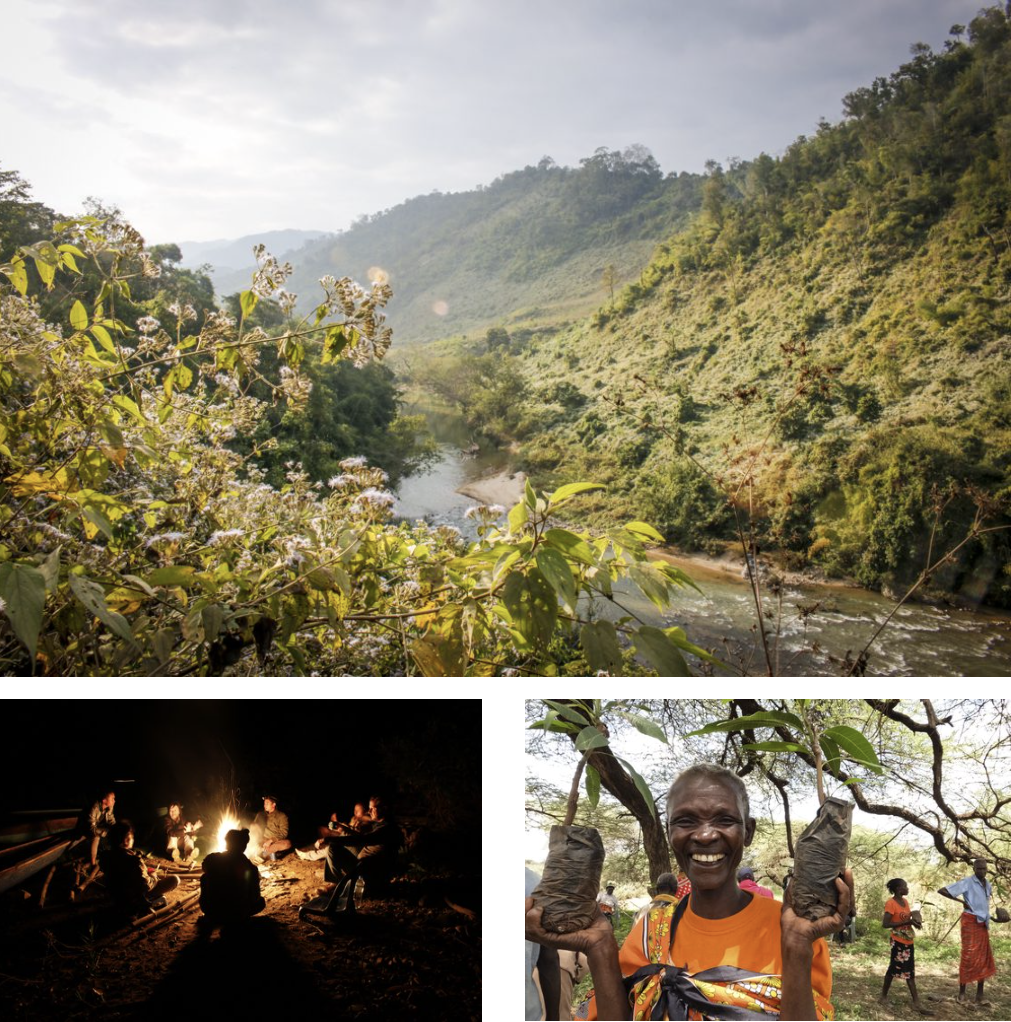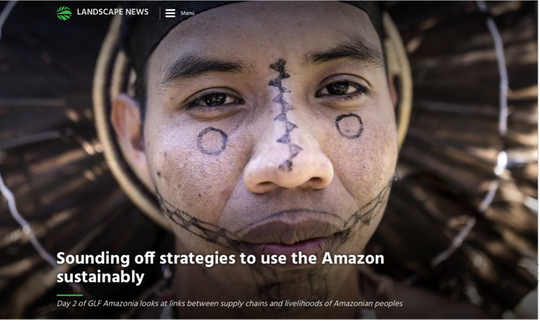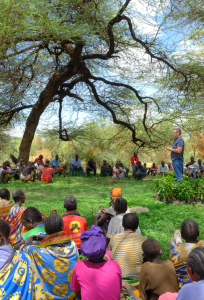
Top and left: Nam Et-Phou Louey National Park, Lao PDR. Right: Isiolo, Kenya.
Welcome to our first newsletter!
Dear ILM Practitioners
A warm thanks to you all for your continued collaboration and engagement with the Central Component (CC). Last year was challenging for many of us. Nevertheless, behind the scenes we have been busy. Now we are looking forward to ramping up our support functions, knowledge-sharing, and engagement with Landscapes For Our Future (LFF) community and project teams.
Central Component:Who? Where? Why?
As you know, the CC exists to provide technical support and opportunities to co-create and synthesize knowledge on Integrated Landscape Management (ILM) implementation across the 23 LFF projects, relevant EU Delegations, and interested parties at the European Commission.
What does that mean in practical terms?
1. Working together with LFF participants to identify the lessons and the knowledge gained through LFF implementation to generate syntheses and other communications products so as to support efforts to influence policy at multiple scales.
2. Facilitating knowledge exchange and cross-project learning by convening structured engagement and outreach events.
3. Technical backstopping support to LFF participants, including project teams, EU Delegations and EC colleagues. (Read more about the scope of that support towards the end of this mail.)
Our CC team is distributed around the world, and all work with CIFOR-ICRAF, an agency with an extensive ILM experience.See the table at the end of this mail for our characterisation of ILM and an introduction to our team members and, importantly, the focal point for each of the LFF projects. Note that these may differ from the people that you have already been engaging with from the CC. In this current line-up, we have sought to rationalize and simplify the engagement between LFF participants and the CC.
First: what do we think Integrated Landscape Management is?
What ILM is, and how it can be achieved, is the focus of a large literature (and a page on our website.) There are variations in the ways that it is understood. Our experience suggests that ILM is a process for managing the competing demands on land through the implementation of adaptive and integrated management systems. When combined with well-planned and executed technical interventions (such as tree growing, sustainable agriculture, etc), ILM enables landscape multi-functionality to be managed, and its benefits (to society and the environment) to be captured and distributed.
We see six critical elements in the ILM process:

Stakeholder identification
The identification of stakeholders, and an assessment of relations amongst them is an essential prerequisite to forming multi-stakeholder fora. Identification via stakeholder mapping, or Net-Mapping.

Multi-stakeholder fora
‘Safe’ spaces in which stakeholders with different interests can gather, deliberate, negotiate, learn and plan. Such spaces need to be highly attentive to power dynamics. Important skills required here include facilitation, mediation, negotiation, and leadership.

Iterative and adaptive management
Clear feedback loops and learning capabilities integrated into institutional and process design. Institutional flexibility and nimble-footedness influence daily operations and decision-making. Monitoring and evaluation support self-reflection, as does research-based evidence, and contribute to future planning.

Common vision
A co-created and co-desired future state (of a landscape) only achievable through stakeholder cooperation. Provides a destination behind which people and initiatives can line up. A vision can provide strong incentives for buy-in, inclusivity, a basis for collective action, and a baseline against which trade-offs can be evaluated and common concernsidentified.

Institutionalisation
ILM fora or processes are identified as some form of entity, deriving sustainable funding, and with associated staff; institutions become a source of identity for their participants. The institution is embedded or ‘nested’ within a broader system and/or organisation.

Technical solutions and tools
Tools, technical capabilities; capacity building for stakeholder platform management; external technical support, input and deliberation.
2021 Highlights
The CC engaged LFF projects in a number of relevant global dialogues, workshops and knowledge-sharing events in 2021.
Policy input and engagement

GLF Amazonia featured LFF’s work in South America, hosting a session entitled “Can we save the Amazon alone? Connections between the Amazon and its neighboring biomes”, which focused on the diverse biophysical and socio-economic interconnections that exist between the Amazon and its neighbouring biomes. The session featured three LFF projects and aimed to identify the threats and trade-offs deriving from pressures and interventions in these biomes, as well as potential ILM solutions.
Read the summary here.
A COP 26 Side event entitled, “Why Nature-based Solutions are crucial for Climate and Resilience” highlighted the crucial role of nature-based solutions in the face of impending and ongoing climate disasters, and featured Carolina Siqueira of the LFF project in Brazil-Paraguay.
Watch the recording on YouTube.
Building our online presence
The Landscapes For Our Future website is now LIVE at https://landscapesfuture.org. The site features 22 project pages, providing information on each project’s objectives and elaborating on its geographic and contextual elements.
Regional Workshops
The CC convened five regional inception workshops with 99 participants from 27 countries. These workshops featured presentations by a select number of LFF projects and discussed project needs and technical support areas. The inception event report, summarising each event and learnings, is available here.

Above: The CC learning mission to Kenya used Net-Mapping exercises to foster discussion by communities as well as partners on perceived and ideal levels of influence within the landscape.
Spotlight on 2022
Fora and missions

During the foundational year of the programme, the CC worked to conceptualise and understand how to best serve the wide diversity of projects across the LFF programme. Year 2 will permit an acceleration of activities with considerable in-person engagements, technical support missions and external communications planned.
During April and May, the Central Component (CC) began the first learning missions planned for Q2 of 2022. Informed by bilateral consultations, these missions will help us to characterise ILM, and to identify the ways in which the CC can better support the LFF projects.
The first of these was a visit to the RangER project in northern Kenya. The trip brought us into contact with many of the project’s stakeholders, and gave us important insights into ILM from the perspective of biodiversity conservation, high levels of nomadism, and working in a semi-arid landscape.
Clarity on the support of the Central Component
The CC recognises that each of the LFF projects (actions) have been developed based on needs identified in the country or region of focus. Each project builds on the capacities of the implementing partners and their past experience. Many projects will require support in highly specific, technical areas. While the CC will always welcome requests for support, many of these requests will likely fall outside of the skill set of its team. The CC is not in a position to bring in new staff and/or consultants to address requests that fall outside of its existing skills.
By engaging closely with projects, we hope to identify areas and ways in which we can support projects from within our CC team and its extensive capabilities in the following areas:
- ILM: Guidance and advice on ILM processes, especially those related to the creation and management of institutions (e.g., multi-stakeholder platforms, convening interventions and methods, facilitation, negotiation, etc) to integrate the management of different landscape claims, and to monitor and evaluate progress towards stated outcomes.
- Livelihoods: How these can both contribute towards, and benefit from, ILM. Support can also be provided on how power asymmetries can be addressed (including amongst genders, and between ethnic groups), and equitability improved.
- Value chains: How these can contribute to engagement with the private sector and leveraged to yield positive ILM outcomes.
- Environment and climate change: How ILM can contribute to climate change mitigation, resilience and adaptation; and how ILM processes can yield positive land and ecosystem health outcomes.
- Cross cutting the above themes are M&E and capacity development, on which the CC will also provide advice and guidance with regards to individual thematic areas.
Meet the CC Team
We sincerely look forward to engaging with you and your partners across the entire LFF programme and beyond, to raise the profile of ILM approaches and to accelerate impact on the ground together!
Mieke Bourne
Senior management and coordination support. Mieke is a stakeholder engagement with evidence specialist and facilitator working at the interface of science, practice, and policy. Her experience is focused on natural resource management, particularly land restoration in Africa and Australia.
m.bourne@cifor-icraf.org
Delia Catacutan
Focal point for Timor Leste, Cambodia and Vietnam. Delia is a natural and rural systems scientist with over two decades of experience in integrated natural resources management, ecosystems services and agroforestry. d.c.catacutan@cifor-icraf.org
Peter Cronkleton
Focal point for Brazil, Honduras, Bolivia, Paraguay, Ecuador, Colombia, Jamaica and the OECS. Peter is an anthropologist with over 20 years of research experience in South and Central America, Africa and Asia. He is an expert on forest livelihoods, natural resource governance, gender and policy reform.
p.cronkleton@cifor-icraf.org
Divine Foundjem
Focal point for the projects in Cameroon, Chad/RCA and Burkina Faso. Divine is an agricultural economist with a large expertise in value chain analysis and development, rural enterprise development, institutional and policy analysis in the forest and agroforestry sector, and natural resources management.
d.foundjem@cifor-icraf.org
Kim Geheb
CC coordinator; focal point for Lao PDR, PNG and Myanmar. Kim is a natural resources governance expert, with a large experience on integrating natural resources management, stakeholder fora, politics, and getting innovations into practice.
k.geheb@cifor-icraf.org
George Schoneveld
Senior management and coordination support; focal point for Ghana. George is a human and economic geographer specialized in landscape governance, certification and inclusive value chain development.
g.schoneveld@cifor-icraf.org
Raphael Tsanga
Focal point for DRC, Senegal and Sao Tome and Principe. Raphael is an environmental lawyer and forest governance expert with a large experience on forest policies, private standards and sustainable timber value chain in Africa. r.tsanga@cifor-icraf.org
Khalil Walji
Deputy CC coordinator; focal point for Kenya, Zimbabwe and Mauritius. Khalil is a soil scientist and a capacity development specialist. He derives his experience from Central America and Africa.
k.walji@cifor-icraf.org



